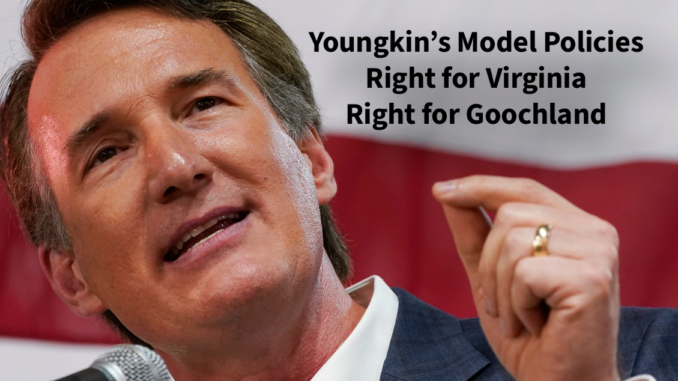
Virginia Gov. Glenn Youngkin’s administration has proposed new policies for the state’s schools regarding how they treat transgender students, including restricting which bathrooms they can use and which pronouns they may go by.
The Virginia Department of Education released its 2022 Model Policies online Friday, effectively rolling back the work of Youngkin’s predecessor, Democrat Ralph Northam. The new rules will effected the more than 1 million children enrolled in the state’s public school system.
The Top 7 Improvements to the Model Policies for Public Schools Relating to Transgender Students:
| 2021 Model Policies – The Bad | 2023 Revised Model Policies – The Good |
| Encourages schools to deceive parents. In addition …, school personnel shall treat information relating to a student’s transgender status as being particularly sensitive, shall not disclose it to other students and parents, and shall only disclose to other school personnel with a legitimate educational interest. (Policy, p.12) | Prohibits schools from hiding student information from parents. No policy, guidance, training, or other written material issued by the [School Division] may encourage or instruct teachers to conceal material information about a student from the student’s parent, including information related to gender. (Policy, p. 15) |
| “Gender identity” is subjective. A student is considered transgender if, at school, the student consistently asserts a gender identity different from the sex assigned at birth… it does not necessarily require any substantiating evidence nor any required minimum duration of expressed gender identity …” (Recommended Standard, p.12) | The default definition of sex is “biological sex.” The word “sex” means biological sex. (Policy, p. 15) The phrase “transgender student” shall mean a public school student whose parent has stated in writing that the student’s gender differs from the student’s sex, or an eligible student who states in writing that his or her gender differs from his or her sex. (Policy, p.12) |
| Students determine name change and preferred pronouns. Schools shall allow students to assert a name and gender pronouns that reflect their gender identity without any substantiating evidence. (Policy, p.13) | Schools use the student’s legal name and corresponding pronouns. [School Division] personnel shall refer to each student using only (i) the name that appears in the student’s official record, or (ii) if the student prefers, using any nickname commonly associated with the name that appears in the student’s official record. (Policy, p. 14) [School Division] personnel shall refer to each student using only the pronouns appropriate to the sex appearing in the student’s official record … (Policy, p. 14) |
| Parents could be reported for child abuse or neglect. Whenever school personnel suspects or becomes aware that a student is being abused, neglected, or at risk of abuse or neglect by their parent due to their transgender identity, they should report those concerns to Child Protective Services immediately. (Recommended Standard, p.13) | Respects the family values taught by parents. Parents have the right to instill and nurture the values and beliefs for their own children … (II Guiding Principles, p. 2) Parents must be informed and given an opportunity to object before counseling services pertaining to gender are given. (Policy, p. 13) |
| Students may use any bathroom or locker room they choose. Access to facilities such as restrooms and locker rooms that correspond to a student’s gender identity shall be available to all students. (Policy, p.18) School staff should not confront students about their gender identity upon entry into the restroom. (Recommended Standard, p.18) | Allows schools to determine bathroom/locker room policies. Students shall use bathrooms that correspond to his or her sex, except to the extent that federal law otherwise requires. See Grimm v. Gloucester County School Board, 972 F.3d 586 (2020) (Policy, p. 16) |
| Schools must allow all students to participate in school activities in accordance with their self-declared gender identity. For any school program, event, or activity, including extracurricular activities that are segregated by gender, [School Division] shall allow students to participate in a manner consistent with their gender identity. (Policy, p. 18) | Any extracurricular activities separated by sex, must determine student participation based on the student’s biological sex. For any school program, event, or activity including extracurricular activities) that are separated by sex, the appropriate participation of students shall be determined by sex rather than gender or gender identity. [School Division] shall provide reasonable modifications to this policy only to the extent required by federal law. (Policy, p. 16) |
| Compels teachers and students to use a student’s preferred pronouns. For transgender students, acts of verbal harassment may include the intentional and persistent use of names and pronouns not consistent with their identity. (Recommended Standard, p.10) When a student asserts that they have a name and/or pronoun affirming their gender identity, school staff should abide by the student’s wishes as to how to address the student. (Recommended Standard, p.13) | Respects the faith-based customs and beliefs of families, and the constitutionally protected freedom of speech. Parents have the right to instill in and nurture values and beliefs for their own children … in accordance with their customs, faith, and family culture. (II Guiding Principles, p. 2) Notwithstanding the provisions of paragraph (4) of this section, [School Division] shall not compel [School Division] personnel or other students to address or refer to students in any manner that would violate their constitutionally protected rights. (Policy, p. 15) |
Be the first to comment